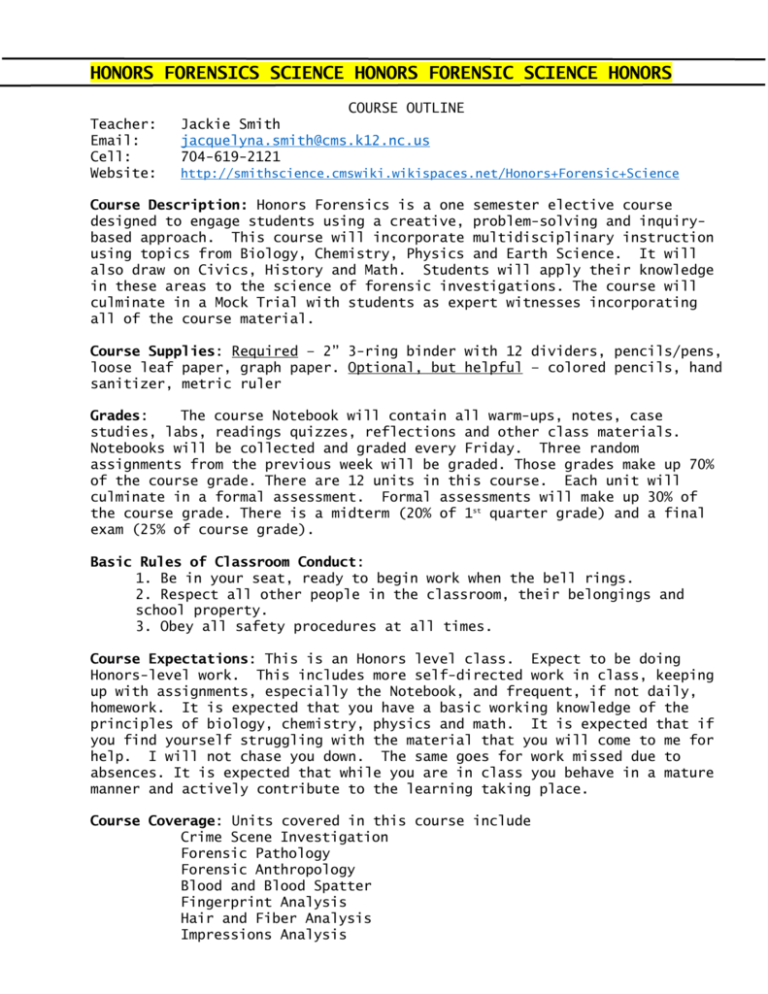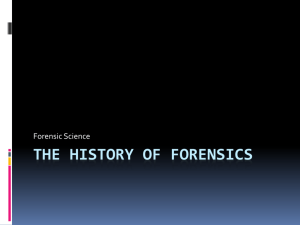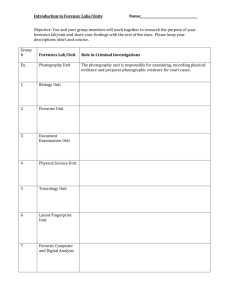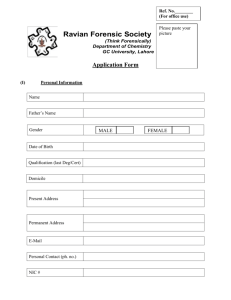Honors Forensic Science Syllabus 14-15
advertisement

HONORS FORENSICS SCIENCE HONORS FORENSIC SCIENCE HONORS Teacher: Email: Cell: Website: COURSE OUTLINE Jackie Smith jacquelyna.smith@cms.k12.nc.us 704-619-2121 http://smithscience.cmswiki.wikispaces.net/Honors+Forensic+Science Course Description: Honors Forensics is a one semester elective course designed to engage students using a creative, problem-solving and inquirybased approach. This course will incorporate multidisciplinary instruction using topics from Biology, Chemistry, Physics and Earth Science. It will also draw on Civics, History and Math. Students will apply their knowledge in these areas to the science of forensic investigations. The course will culminate in a Mock Trial with students as expert witnesses incorporating all of the course material. Course Supplies: Required – 2” 3-ring binder with 12 dividers, pencils/pens, loose leaf paper, graph paper. Optional, but helpful – colored pencils, hand sanitizer, metric ruler Grades: The course Notebook will contain all warm-ups, notes, case studies, labs, readings quizzes, reflections and other class materials. Notebooks will be collected and graded every Friday. Three random assignments from the previous week will be graded. Those grades make up 70% of the course grade. There are 12 units in this course. Each unit will culminate in a formal assessment. Formal assessments will make up 30% of the course grade. There is a midterm (20% of 1st quarter grade) and a final exam (25% of course grade). Basic Rules of Classroom Conduct: 1. Be in your seat, ready to begin work when the bell rings. 2. Respect all other people in the classroom, their belongings and school property. 3. Obey all safety procedures at all times. Course Expectations: This is an Honors level class. Expect to be doing Honors-level work. This includes more self-directed work in class, keeping up with assignments, especially the Notebook, and frequent, if not daily, homework. It is expected that you have a basic working knowledge of the principles of biology, chemistry, physics and math. It is expected that if you find yourself struggling with the material that you will come to me for help. I will not chase you down. The same goes for work missed due to absences. It is expected that while you are in class you behave in a mature manner and actively contribute to the learning taking place. Course Coverage: Units covered in this course include Crime Scene Investigation Forensic Pathology Forensic Anthropology Blood and Blood Spatter Fingerprint Analysis Hair and Fiber Analysis Impressions Analysis Firearms Identification and Ballistics DNA Analysis Toxicology Questioned Documents Arson and Explosives Late Work Policy: If you are absent from class for any reason, you can find the work you missed on the Unit Outline and the website. All work, other than labs, must be made up by the 2nd day you return to school. All labs will have to be made up after school within one week of the absence. Due to space constraints, I cannot keep lab materials for past labs around any longer. It is your responsibility to make the arrangements. Tutoring/Office Hours: Office hours will be posted in the classroom and will be at least one afternoon a week for an hour. Further times can be arranged individually. Notebook Set Up: Every unit will start with a labeled divider followed by a copy of the Unit Outline. Notes will be sequential. You should have an entry matching each activity on the Unit Outline. See the example below. Unit: Intro to Forensic Science IQ: What information can be discovered from a properly processed crime scene and what can be determined from that information? 8/25 Warm Up: Filled out info card and read over syllabus Discussion: Discussed expectations, lab safety – absolutely no eating or drinking in the classroom (except clear water when we are not doing labs). Any other notes from the discussion. Case Study: John Joubert – here you write your notes about today’s case study. Notes: ppt Intro to Forensic Science Write your notes from the power point Activity: Questions on Intro to Forensic Science 1. answer questions in your notes, restating the question in your answers so they are useful to you. 2. etc… Activity: Historical Timeline - got assignment – research John Toms and why he’s important to the history of forensics Reflection: The area of forensic science that interests me the most is Forensic Odontology because my mom is a dentist and I think it's cool how they can identify bodies from teeth. I also like how they can reconstruct what a face looked like from the structure of their bones. I’d like to learn how to do that. … 8/29 (Format for last day of Unit) Warm Up: … Case Study Case: Modus Operandi: Motivation: Evidence used against defendant: Comparisons to previous Case Study: Contrasts to previous case study: Specialist: Lab(s) Results Summary: Analysis: Conclusion: Reflection: IQ: Answer to IQ: Test Crime Scene Investigation






